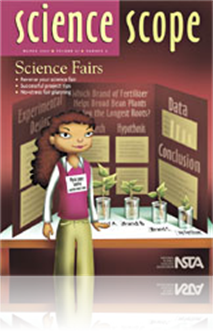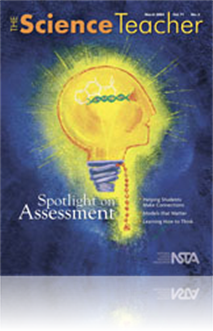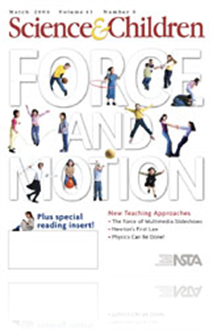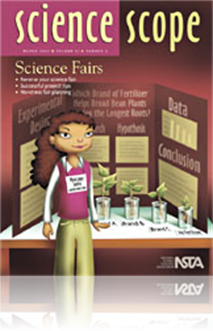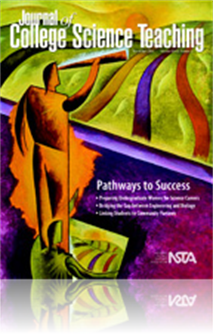All Resources
Journal Article
Few things capture the spirit of spring like flying a kite. Watching a kite dance and sail across a cloud-spotted sky is not only a visually appealing experience, it also provides a foundation for studies in science and mathematics. In this kite-buil...
Journal Article
Scope on the Skies: And now there are five
This month opens with four of the five brightest planets (Venus, Mars, Saturn, and Jupiter) very visible as they line up across the evening skies after sunset, stretching from the western horizon to the southeastern horizon. The month closes with the...
Journal Article
Chemistry is a difficult subject for students to understand because its core concepts—atoms, molecules, and chemical bonds—cannot be directly observed. Students primarily learn chemistry through their senses and do not distinguish between explana...
Journal Article
With some creative integration, this teacher increased student interest in physical science and received a 2002 NSTA Toyota TAPESTRY Grant. Her project, a physics trail on school grounds, included stations devoted to glacial history, animals, Nati...
Journal Article
Reverse Your Science Fair with Educational Partnerships
Do your students roll their eyes and groan at the idea of another science fair? If so, try implementing a different twist on science fairs, where teachers can arrange for adults to present projects to students. This non-traditional fair solicits facu...
Journal Article
Outstanding Science Trade Books for Student K-13 (Books Published in 2003)
The Outstanding Science Trade Books for Students K-12 are selected every fall by an NSTA committee. These are the books selected for the publishing year 2003. Texts are cited for having substantial science content, clear, accurate, up-to-date inform...
Journal Article
Science Sampler: Multiple intelligences and lab groups
Science teachers who are committed to excellence in the classroom continually seek ways to improve teaching and learning, and the concept of multiple intelligences holds promise as a method for accomplishing this. Acknowledging these intelligences of...
Journal Article
Multidisciplinary Explorations
A course integrating the fields of engineering and biology was developed to teach students to solve real-world problems that included aspects from both disciplines. Computer simulations were developed and carried out, and findings were presented in a...
Journal Article
Editor's Corner: Modeling Clay, Whiteboards, and Poster Sessions
As classroom teachers, we develop great expertise with sticky notes, whiteout, and highlighters. They are the staples of our daily survival along with the trusty stapler and scotch tape dispenser (usually empty) found on our desks. This month’s col...
Journal Article
The Force of Multimedia Slideshows
In this project, fourth-grade students researched physical science concepts and then shared their knowledge with multimedia presentations. Students used the Internet, digital cameras, and Hyperstudio software to create presentations on the meaning...
Journal Article
The concept of energy arises in all disciplines of science, from ecosystems and species niches to gravity and motion. However, most students have difficulty understanding the relative sense of energy. To help students grasp this difficult concept, t...
Journal Article
Non-Traditional Characteristics of a Successful Science Fair Project
Although science fairs are designed to help students develop inquiry skills, including writing research proposals, working with peers, and sharing experimental findings, simply holding a science fair is no guarantee that students will actually acquir...
Journal Article
These surefire strategies will help teachers effectively use nonfiction trade books in the science classroom. Tips are provided for using the K-W-L organizational format, building a nonfiction library, and giving "book talks."...
Journal Article
Home Connections: Objects in Motion
These activities, which are designed for students to try at home, focus on Newton's First Law of Motion. A simple explanation of the law is provided along with two demonstrations of inertia....
Journal Article
Science Sampler: The In-Class Science Exhibition
One of the easiest ways to capture students’ sense of wonder is to provide them an opportunity to participate in scientific research and display their findings in a science exhibition. Giving students the freedom to follow their own interests and d...



